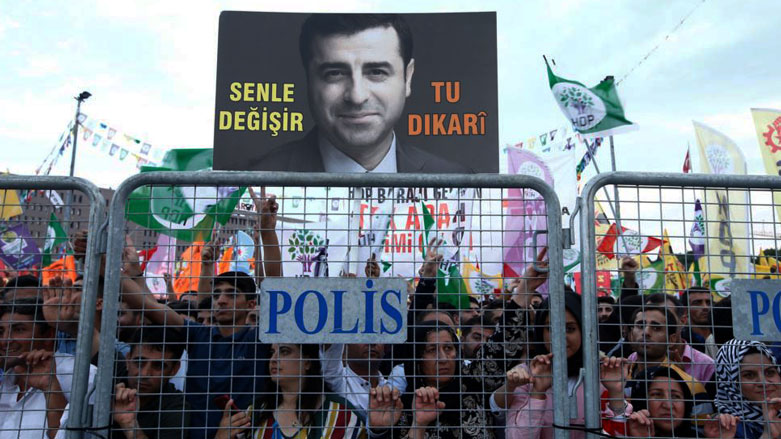US urges respect for democratic rights in Turkey

WASHINGTON DC (Kurdistan 24) – “Respect for fundamental political rights and freedoms is a pillar of democracy,” a State Department spokesperson told Kurdistan 24.
“These rights need to be protected, to include the respect for due process and freedom of expression,” as she added, “the right to freedom of expression, peaceful assembly, and association are fundamental to any healthy democracy.”
The spokesperson’s statement came, as Kurdistan 24 asked for the US response to a Turkish court ruling earlier this month calling for the release from prison of Selahattin Demirtas, co-chair of the pro-Kurdish People’s Democratic Party (HDP) and a former Turkish parliamentarian.
Demirtas has been languishing in prison on dubious charges since November 2016—although he is a major Turkish political figure. In the country’s 2014 presidential election, he came in third, winning nearly 10% of the vote. In the 2018 presidential election, he again finished third, with 8.4% of the vote, despite being in jail.
In Turkey’s June 2015 parliamentary elections, the HDP won 13% of the vote, crossing the 10% threshold required for a party to sit in the Grand Assembly. The HDP, thus, became the first pro-Kurdish party to participate in Turkey’s parliament.
The ruling Justice and Development Party (AKP) lost its majority in that vote. Turkish President Recep Tayyip Erdogan called for snap elections, which were held in November. The AKP regained its majority, but the HDP still won 10% of the vote and remained in parliament.
Three years ago, when he was first arrested, Demirtas was charged with a slew of terrorism-related offenses, including leading a terrorist organization and promulgating terrorist propaganda. He faces up to 142 years in prison, but has yet to stand trial.
Some two weeks ago, on September 2, a Turkish court of appeals upheld a lower court ruling that Demirtas’ pre-trial detention was unlawful.
Read More: Turkish court rules for release of Kurdish leader Selahattin Demirtas
However, in September 2018, while he was still in prison and awaiting trial, Demirtas was convicted for a new, separate offense: allegedly making and spreading terrorist propaganda by praising the Kurdistan Workers’ Party (PKK) in a March 2013 speech on the Kurdish New Year.
At that point, and, specifically on that occasion, the PKK, in the person of its leader, Abdullah Ocalan, called for a ceasefire and an end to armed struggle.
Erdogan, himself, welcomed Ocalan’s statement, and peace negotiations between Ankara and the PKK followed.
Yet for his statement on that occasion, Demirtas was sentenced in 2018, five years later, to a prison term of four years and eight months.
At that point—September 2018—the European Court of Human Rights (ECHR) was considering the original terrorism charges against Demirtas. Two months later, in November, it would denounce them, saying they aimed at “stifling pluralism and limiting freedom of political debate.” as it called for his immediate release.
Read More: European human rights court orders Turkey to free Kurdish leader Demirtas
The second charge against Demirtas, thus, served as a means to keep him in prison, if the ECHR ruled in his favor—which it, in fact, did.
Following decision of the Turkish court earlier this month that Demirtas’ pre-trial detention is unlawful, his legal team has applied for his release, arguing that he has served most of the sentence on the charge for which he was convicted, and he is, therefore, eligible for parole.
Read More: Lawyers call for imprisoned Selahattin Demirtas to be released on parole
Speaking to Kurdistan 24, Giran Ozcan, HDP representative in Washington, explained that he welcomed the State Department’s support for democracy and political rights in Turkey.
“They are important principles for the HDP,” he said, “and we are dedicated to promoting them.”
But Ozcan also noted that the original question to the State Department had been about Demirtas and “its response would have been more meaningful, if it had specifically addressed his situation.”
